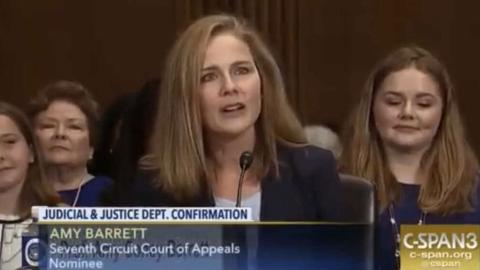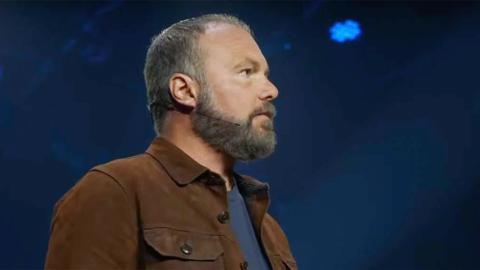
Amy Coney Barrett and the Hypocrisy of Anti-Catholic Attacks Against Her
Share This article
NEWS ANALYSIS
Sen. Mitt Romney (R-Utah) said Tuesday he supports President Donald Trump’s effort to name a successor to the late Justice Ruth Bader Ginsburg’s seat on the U.S. Supreme Court, paving the way for a political showdown of religious proportions.
Trump is set to formally announce his high court nominee Saturday.
The anti-Catholic attacks against SCOTUS frontrunner Judge Amy Coney Barrett, a former Notre Dame law professor, are already flowing, building on the groundwork laid in 2017 by Sen. Dianne Feinstein, who voiced her “concern” over Barrett’s faith during her confirmation to the 7th Circuit Court of Appeals.
Faithwire: Partisan Battle Lines Form Even Before There’s a Nominee to Replace Justice Ginsburg
“I think in your case, professor, when you read your speeches, the conclusion one draws is that the dogma lives loudly within you,” said Feinstein. “And that’s of concern.”
But what does that really mean? Despite its cultural connotations, “dogma” is just another word for one’s philosophy — a core set of absolute principles that guide a person’s lifestyle. Everyone subscribes to some sort of dogma, whether it’s religious or secular.
In fact, a “dogma live[d] loudly within” Ginsburg as well.
The late justice, a political icon among progressives, was profoundly influenced by the Jewish faith she practiced as a child. Growing up, Ginsburg memorized the stories of women from the Jewish Bible, and although she eventually abandoned much of the religious practices of Judaism, the jurist never stopped fighting for Jewish people and their priorities.
Following her nomination to the D.C. Circuit Court of Appeals in 1980 by then-President Jimmy Carter, Ginsburg worked behind the scenes as an advocate. After hearing complaints from Orthodox Jewish lawyers that a court-issued certificate included the phrase, “In the Year of Our Lord,” clearly framing the calendar in a Christian context, Ginsburg fought successfully to have the phrase removed. She also urged the court — again, successfully — to not hear cases on Yom Kippur, a significant holy day on the Jewish calendar.
One needed look no further than Ginsburg’s SCOTUS chamber to see just how “loudly” within her the “dogma” lived. Hanging in her office was a plaque with an inscription from Deuteronomy: “Justice, justice you shall pursue.”
So obviously, the “concern” over Barrett isn’t really about her faith; it’s her conservative values. Had the originalist judge’s “dogma” led her toward progressive ends, as it did for Ginsburg, there would be no need to use her Catholicism as a cudgel against her.
Barrett is, however, Trump’s potential nominee, and it’s an election year.
If her 2017 confirmation hearing is any indication of what’s to come, Barrett — or any other nominee appointed by the president — should be prepared for intense attacks against her faith from Democratic lawmakers.
In addition to Feinstein’s comments, Sen. Dick Durbin (D-Ill.) questioned Barrett over whether she considers herself an “orthodox Catholic.”
Faithwire: ‘She Led an Amazing Life’: President Trump’s Spontaneous Tribute to Justice Ruth Bader Ginsburg
“If you’re asking whether I’m a faithful Catholic, I am, although I would stress that my own personal church affiliation or my religious belief would not bear on the discharge of my duties as a judge,” Barrett replied at the time.
Then, of course, there are those who claim in deliberate ignorance that Barrett would work as an activist justice to advance a theocracy. That obtuse claim is based, apparently, on a commencement address Barrett gave all the way back in 2006, when she told graduates of Notre Dame, a Catholic university, “Your legal career is but a means to an end … and that end is building the Kingdom of God.” The then-professor was not telling students to bend the law toward Catholic priorities, as has been suggested. Rather, she went on to tell the graduates to remember their “fundamental purpose in life is not to be a lawyer, but to know, love, and serve God.”
Much like Ginsburg, Barrett has simply lived a life that reveals how her own personal philosophy has inspired her. Any faith-based attacks against the 48-year-old judge should be seen as nothing more than low brow, politically motivated jabs.
What Else?
Looking forward to what’s to come, and remembering the anti-Catholic attacks Barrett and other Trump nominees have already faced, Sen. Ben Sasse (R-Neb.) is reminding his fellow lawmakers that “attacks on religious liberty have no place in Congress.”
“During her confirmation hearing, Judge Barrett faced some disgusting attacks on her faith,” Sasse told the Daily Caller. “The anti-Catholic bigotry she and other nominees have seen over the last few years is reprehensible.”
The senator also told his fellow politicians to keep in mind a unanimously affirmed resolution he introduced last year, condemning anti-Catholic tests. Sasse’s resolution, it should be noted, came after Sen. Kamala Harris (D-Calif.) — now the Democratic vice presidential nominee — seemed to suggest Trump’s choice to serve as a judge on the U.S. District Court of Nebraska, Brian C. Buescher, was unfit for office because of his ties to a leading Catholic charity, the Knights of Columbus.
Sen. Bernie Sanders (I-Vt.), a former contender for the Democratic presidential nomination, has similarly attacked nominees’ religious beliefs.
As for Barrett, she has rejected any anti-religious attacks from politicians.
She addressed Democrats’ criticisms during remarks she made in 2019 at Hillsdale College’s campus in Washington, D.C.
“We have a long tradition of religious tolerance in this country, and in fact, the religious test clause in the Constitution makes it unconstitutional to impose a religious test on anyone who holds public office,” she said.
Barrett continued, “I think when you step back and you think about the debate about whether someone’s religion has any bearing on their fitness for office, it seems to me that the premise of the question is that people of faith would have a uniquely difficult time separating out their moral commitments from their obligation to apply the law. I think people of faith should reject that premise.”
STAY UP TO DATE WITH THE FREE CBN NEWS APP!
Click Here Get the App with Special Alerts on Breaking News and Live Events!
Share This article




